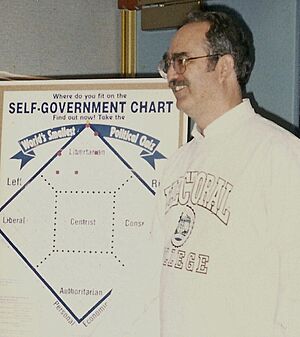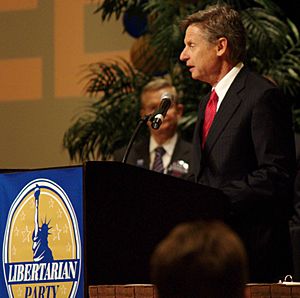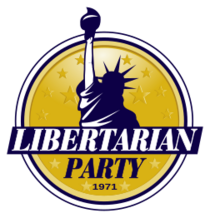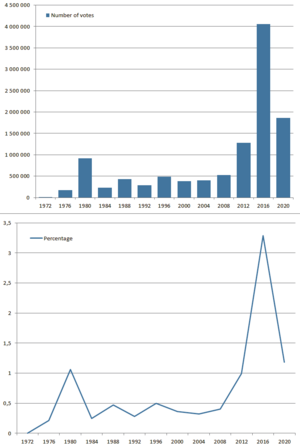Libertarian Party (United States) facts for kids
Quick facts for kids
Libertarian Party
|
|
|---|---|
 |
|
| Abbreviation | LP |
| Chairperson | Steven Nekhaila |
| Governing body | Libertarian National Committee |
| Founder | David Nolan |
| Founded | December 11, 1971 |
| Headquarters | 1444 Duke St. Alexandria, Virginia 22314 |
| Membership (2024) | |
| Ideology |
|
| International affiliation | International Alliance of Libertarian Parties |
| Colors | Gold-yellow |
| Slogan | The Party of Principle |
| Senate |
0 / 100
|
| House of Representatives |
0 / 435
|
| State governors |
0 / 50
|
| State upper chambers |
0 / 1,972
|
| State lower chambers |
0 / 5,411
|
| Territorial governors |
0 / 5
|
| Seats in territorial upper chambers |
0 / 97
|
| Seats in territorial lower chambers |
0 / 91
|
| Other elected officials | 146 (June 2025)[update] |
| Election symbol | |
 |
|
The Libertarian Party (LP) is a political party in the United States that believes in personal freedom and limited government. The party supports civil liberties, not getting involved in other countries' problems, and a type of capitalism called laissez-faire, which means the government interferes very little with the economy.
It was started on December 11, 1971, in Colorado Springs, Colorado. The founder, David Nolan, and others were concerned about government actions at the time, like the Vietnam War and government control over wages and prices.
The Libertarian Party is often seen as different from the two major parties. Gary Johnson, who ran for president as a Libertarian in 2012 and 2016, said the party is more socially liberal than the Democrats and more fiscally conservative (careful with government spending) than the Republicans.
Key ideas of the party include lowering taxes, reducing the national debt, and letting people choose whether to be in Social Security. They also support protecting the right to own guns and ending the death penalty.
As of 2024, the Libertarian Party is the third-largest political party in the U.S. based on how many voters are registered with it. In 2020, Justin Amash became the first Libertarian member of the U.S. Congress.
Contents
History of the Libertarian Party

The Libertarian Party held its first national meeting in June 1972. That year, their vice-presidential candidate, Tonie Nathan, became the first woman in U.S. history to receive an electoral vote.
In 1978, Dick Randolph from Alaska was the first Libertarian elected to a state legislature. By the 1980s, the party had become the third-largest in the country. The party grew a lot in the mid-1990s, and by 1996, it was the first third party to get on the ballot in all 50 states for two presidential elections in a row.

In the 2012 election, the party's candidate, Gary Johnson, received over 1.2 million votes, a record for the party at the time. In the 2016 election, Johnson ran again and got more than 4.4 million votes, breaking his own record.
Over the years, several state lawmakers have joined the Libertarian Party after being elected as Republicans or Democrats. In 2020, Marshall Burt won a seat in the Wyoming House of Representatives, the first time a Libertarian had won such an election since 2000.
The Dallas Accord
In 1974, the party had two main groups with different ideas about government. One group, called minarchists, believed a small government was needed to protect people's rights. The other group, anarcho-capitalists, believed there should be no government at all.
At a convention in Dallas, Texas, they made an agreement called the Dallas Accord. They decided the party's official platform would not take a side on whether government should exist. This allowed both groups to work together to make the government smaller. This agreement helped the party welcome people with different views on the ideal size of government.
The Mises Caucus Takeover
In 2022, a group called the Mises Caucus gained control of the party's leadership. This group has different ideas from some traditional Libertarians, and their rise led to disagreements within the party.
After the Mises Caucus took over, some state-level Libertarian parties decided to separate from the national party. This led to the creation of new groups, like the Liberal Party USA, for members who disagreed with the new direction.
Party Name and Symbols
The name "Libertarian Party" was chosen in 1972. The party's first slogan was "There ain't no such thing as a free lunch," often shortened to "TANSTAAFL." This phrase means that nothing is truly free, and someone always has to pay for it. Today, the party's slogan is "The Party of Principle."
The party's first symbol was an upward-pointing arrow called the "Libersign." Later, they used the Statue of Liberty as a symbol. In 2015, they adopted a logo with an eagle holding a torch. Another popular mascot for the party is a porcupine, because it is a defensive animal that doesn't bother anyone unless it is bothered first.
What the Libertarian Party Believes
The Libertarian Party's main goal is to create a world where people are free to live their own lives without being forced to give up their values for others. The party's platform, which is a statement of its beliefs, focuses on individual liberty, a peaceful foreign policy, and free trade.
Economic Issues
Libertarians believe the government's only role in the economy should be to protect property rights and make sure people follow their agreements. They support a laissez-faire capitalist system.
- Taxes and Spending: The party wants to lower taxes and get rid of the Internal Revenue Service (IRS). They support a Balanced Budget Amendment to the Constitution to stop the government from spending more money than it has.
- Healthcare: Libertarians favor a free-market healthcare system where people can choose their own doctors, treatments, and insurance without government rules.
- Education: The party believes education is a parent's responsibility. They support ending the public school system and letting the free market provide more educational choices.
- Environment: Libertarians think that private property owners and conservation groups are the best protectors of the environment. They believe free markets encourage new technologies that can help protect the planet.
Social Issues
The Libertarian Party supports personal freedom in social matters. The party's platform says that consenting adults should be free to choose their own personal relationships and practices.
- Freedom of Speech: The party is strongly against any form of government censorship. They believe in complete freedom of speech and expression for everyone.
- Gun Rights: Libertarians support the Second Amendment right to keep and bear arms. They oppose laws that restrict gun ownership.
- Crime: The party believes that the justice system should focus on protecting people from force and fraud. They also support ending the death penalty.
- LGBT Rights: The Libertarian Party has a long history of supporting equal rights for all individuals, regardless of their personal relationships or identity. They were one of the first parties to support same-sex marriage.
Foreign Policy
Libertarians believe the U.S. should not get involved in the affairs of other countries. This idea is called non-interventionism. They want to bring American troops home from around the world and stop sending money (foreign aid) to other nations. They believe that free trade is the best way to build peaceful relationships with other countries.
How the Party Has Performed in Elections
The Libertarian Party is a "third party," which means it is smaller than the Republican and Democratic parties. While it has never won a presidential election, it has had some success.
In 1972, the party's first presidential candidate, John Hospers, received one electoral vote from a "faithless elector" (an elector who doesn't vote for the candidate they promised to). In 2016, another faithless elector cast a vote for Ron Paul, a longtime Libertarian.
The party has had its best results in presidential elections with candidate Gary Johnson. In 2016, he received nearly 4.5 million votes, which was about 3.3% of the total votes cast nationwide.
Libertarians have had more success in state and local elections. Over the years, several Libertarians have been elected to state legislatures in places like Alaska, New Hampshire, and Wyoming.
Notable Election Results
- President: In 1980, Ed Clark won 11.7% of the vote in Alaska. In 2016, Gary Johnson won 9.3% in New Mexico.
- U.S. Senate: In 2020, Ricky Dale Harrington Jr. received 33.5% of the vote in Arkansas.
- U.S. House: In 2012, Joel Balam received 31.6% of the vote in a Kansas district.
- Governor: In 1982, Dick Randolph received 14.9% of the vote in Alaska.
Images for kids
-
Representative Justin Amash, who became the first Libertarian member of Congress in 2020.
See also
 In Spanish: Partido Libertario (Estados Unidos) para niños
In Spanish: Partido Libertario (Estados Unidos) para niños
 | Isaac Myers |
 | D. Hamilton Jackson |
 | A. Philip Randolph |









